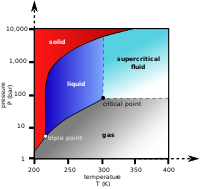
Photo from wikipedia
Abstract Metallic corrosion is a major issue that leads to an efficiency loss and eventual failure of the system in geothermal power plants. Despite the growing understanding of mechanisms of… Click to show full abstract
Abstract Metallic corrosion is a major issue that leads to an efficiency loss and eventual failure of the system in geothermal power plants. Despite the growing understanding of mechanisms of corrosion, inhibiting steel corrosion in the acidic geothermal fluids, remains to present formidable challenges due to its intrinsic physicochemical complexity. Here, we study the use of nanobubbles as a possible corrosion inhibitor by testing alteration of the low-carbon steel plates immersed in acidic geothermal water with continuously injected air-nanobubbles. Nanobubbles have been used in a broad range of areas as they are eco-friendly, low-cost, easy-to-use and high-functional materials. We, for the first time to our knowledge, found that air-nanobubbles could inhibit steel corrosion, with inhibition efficiency of up to 50 % in the studied acidic geothermal fluid. Air-nanobubbles could act as a nanoscopic coating material in the acidic geothermal fluid, through generating a bubble mattress and/or promoting nucleation and aggregation of a very small quantity of silica precipitation on the surface of steel plates. Our finding suggests that nanobubbles can inhibit steel corrosion in various chemically different geothermal fluids, highlighting the physicochemical significance of nanobubbles as the coating material for inhibiting metal degradation in the geothermal infrastructures.
Journal Title: Geothermics
Year Published: 2021
Link to full text (if available)
Share on Social Media: Sign Up to like & get
recommendations!